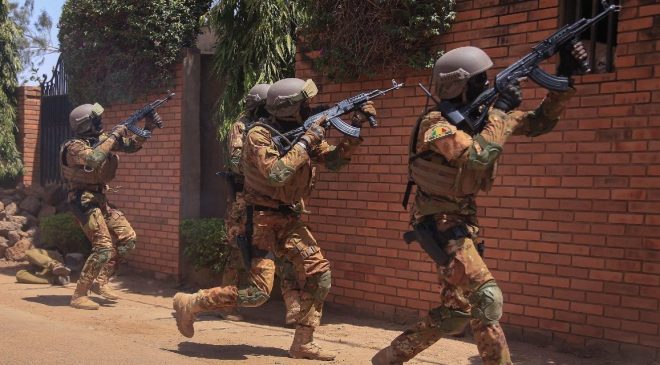
In a harrowing report released today, Human Rights Watch has documented several dozen cases of summary executions and forced disappearances of civilians in Mali’s central region since December 2022. The accused perpetrators include Malian armed forces and foreign fighters suspected to be from the Russia-linked Wagner Group. The violence has also involved the destruction and looting of civilian property, as well as allegations of torture in an army camp.
Calls for UN Peacekeeping Force Withdrawal Amid “Crisis of Confidence”
On June 16, 2023, Malian Foreign Minister Abdoulaye Diop urged the United Nations Security Council to withdraw the UN Multidimensional Integrated Stabilization Mission in Mali (MINUSMA) “without delay,” citing a “crisis of confidence” between the Malian authorities and the 15,000-member UN peacekeeping force. Subsequently, on June 28, the UN Security Council decided to “terminate MINUSMA’s mandate,” while keeping personnel in place until December 31 to plan and execute the cessation of operations and transfer of tasks.
The Implications of UN Peacekeepers’ Withdrawal
The withdrawal of UN peacekeepers heightens concerns about the protection of civilians during military operations. Carine Kaneza Nantulya, deputy Africa director at Human Rights Watch, stressed the importance of the African Union and the Economic Community of West African States (ECOWAS) expressing their concerns about the grave abuses by Malian armed forces and alleged Wagner Group fighters. Nantulya emphasized the need to increase pressure on the Malian authorities to halt these violations and hold the responsible individuals accountable.
Evidence of Abuses and International Sanctions
Human Rights Watch conducted interviews with 40 individuals with knowledge of the incidents in central Mali, including witnesses, family members of victims, community leaders, civil society activists, representatives of international organizations, and political analysts. The evidence collected included a video showing abuses by Malian soldiers and affiliated foreign forces. The Malian government, in response to Human Rights Watch’s findings, stated it was not aware of any human rights violations but confirmed the initiation of a judicial investigation into potential war crimes and crimes against humanity. Furthermore, international measures have been taken against individuals and entities linked to the Wagner Group. In February 2023, the Council of the European Union imposed “additional restrictive measures” against the head of the Wagner Group in Mali. The United States Department of the Treasury and the State Department also imposed sanctions and visa restrictions on individuals associated with the Wagner Group.
A Complex Conflict with Grave Consequences
Mali has been grappling with intensified hostilities since 2022, with the Malian armed forces conducting counterinsurgency operations against the Al-Qaeda-affiliated Jamaa Nusrat al-Islam wal-Muslimin (JNIM) and the Islamic State in the Greater Sahara (ISGS). Both armed groups have perpetrated serious abuses against civilians, further exacerbating an already dire humanitarian crisis in the region. The abuses documented by Human Rights Watch are particularly disturbing as most of the victims belong to the pastoralist Peuhl or Fulani ethnic groups. Islamist armed groups have targeted Fulani communities, exploiting grievances with the government and other ethnic groups.
While Mali’s military government initially denied the presence of Wagner fighters, mounting evidence suggests activities and abuses in the country by the Russia-linked private military security company Wagner Group. The situation in Mali remains highly complex, with the withdrawal of UN peacekeepers posing significant challenges to civilian protection and monitoring of abuses by all parties involved. Independent expert collaboration and accountability mechanisms are urgently needed to address the ongoing human rights crisis in the region.
